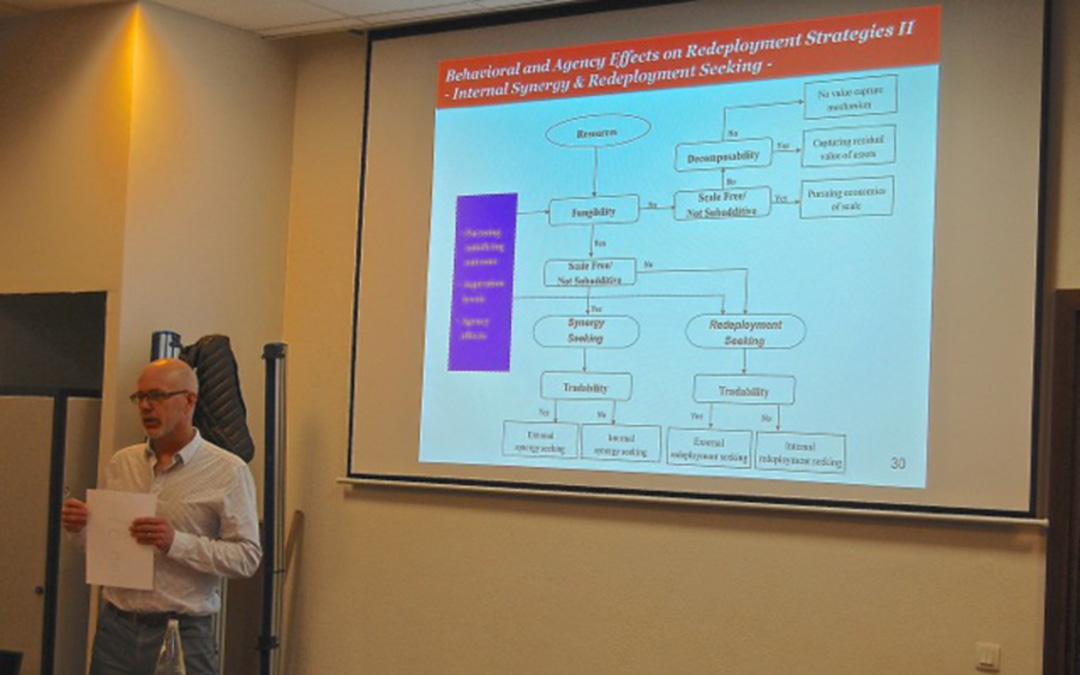
When does it make sense for corporations to expand by adding additional products or businesses to their portfolio?
The topic was the subject of a three-day international conference last month in Strasbourg, France, titled, “Corporate Strategy and Resource Redeployment,” which was organized by UConn Management Professor Timothy B. Folta.
The November conference was sponsored by the University of Strasbourg Institute for Advanced Study, where Folta is an Academic Fellow. Fellowships are granted to high-profile scholars across all disciplines so that they can pursue specific research projects. The University of Strasbourg has been awarded three Nobel Prizes in recent years.
“Existing literature explains that diversification creates value by improving efficiency because firms can simultaneously share resources across multiple businesses,” he said. “Our emerging theory explains a second benefit to diversification – firms gain flexibility to withdraw resources from declining businesses and redeploy them to growing ones.”
The conference drew 30 academics from London, Tel Aviv, Switzerland, Spain, France and Canada, as well as many from American universities, including Stanford University, University of Texas, University of Michigan, University of Pennsylvania, Penn State University, and University of Florida.
“The content of the program was exceptional and the conference allowed academics to refine the 12 papers that were under review and create new collaborations,” Folta said.
The conference is linked to a journal publication in Advances in Strategic Management on the same topic, co-edited by Folta, Professor Constance Helfat of Dartmouth College and Professor Samina Karim of Boston University.
“We believe that the ability to deploy resources across multiple business units is an important way to create corporate value. Having the ability to partially or completely withdraw resources from one business and allocate them to another business is a different, and possibly equally important strategic use of resources, which is less recognized and understood,” Folta said.
“When firms can redeploy their resources in this manner, it provides greater potential to escape from declining prospects in a business and it is particularly valuable in turbulent environments,” he said.
Among the questions being researched is whether resource redeployment is only relevant for multi-business firms; if it is more important in certain business environments, such under high uncertainty or in industries with short product life cycles; and how resource redeployment affects the evolution of firms and industries. Researchers are also investigating how companies can identify redeployment opportunities and how can they manage the related human-resource challenges associated with redeployment.
“Resource redeployment seems to be a common strategy, yet, there exists no research demonstrating how much firm value is attributable to having the flexibility to redeploy resources,” Folta said.
Professor Jaideep Anand of Ohio State University said he found the conference to be inspiring.
“The conference in Strasbourg was very well organized by Tim Folta and his associates. There was an excellent intellectual exchange on the topic of resource redeployment, and a small, focused community was brought together,” Anand said. “I truly enjoyed every aspect of the conference.”
Folta is the Thomas John and Bette Wolff Family chair of Strategic Entrepreneurship at UConn and has been a member of the faculty since 2013. He is also the director of the Connecticut Center for Entrepreneurship and Innovation and co-director of the UConn Innovation and Entrepreneurship Consortium.
His research and teaching examine both entrepreneurship and corporate strategy, analyzing how uncertainty constrains behavior and how managers and entrepreneurs use organizational design and scope decisions to cope with uncertainty, for which he has won a number of prestigious awards, including the 2012 IDEA Foundational Paper Award by the Entrepreneurship Division of Academy of Management, the 2009 Fulbright Special Senior Scholar Award, and a number of best paper awards.